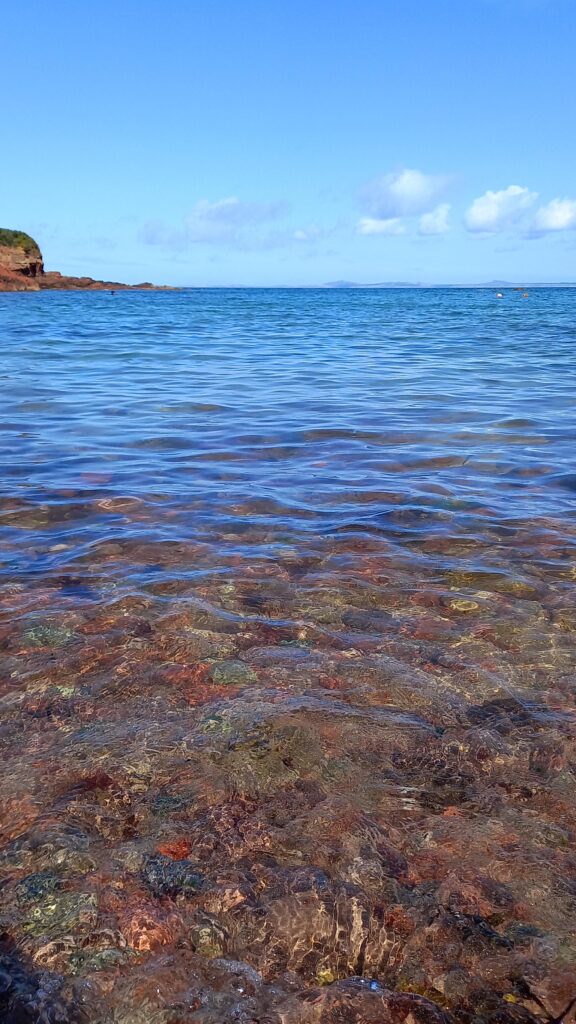Glinting shards of diamond light are bouncing off the teal-turquoise water as that familiar salty, seaweed aroma fills my nostrils. I’m gently suspended in the buoyant liquid, watching gulls circle overhead and feeling the warm, summer sun caress my face. And I feel a sense of absolute peace and pleasure that swells inside me.
I’m not long back from a glorious break in the spectacularly beautiful Pembrokeshire National Park. Rolling countryside, folded rocks, cliffs carved by millennial pounding of waves, incredible crimson sea-mirrored sunsets, golden sands and acres of sunflowers dancing in tune to the light and the breeze.
If you’ve spent time by the sea in the UK this hot and sunny summer you’ll no doubt have experienced a similar sense of freedom and joy. Did you, like me, take daily swims in the salty brine that left you feeling uplifted and energised, with a huge smile on your face? If so, there’s a reason for that – 10 in fact.



Research increasingly shows that being in, on or next to seascapes has an incredibly therapeutic effect on us – mind, body and soul. Let me explain:
1. Being by the coast can reduce depression.
Research has shown that people who live close to the sea have better mental health, lessening the likelihood of taking medication to treat depression, than those living in urban areas. The concept of Blue Mind – how being near, on or in water can make you happier and healthier – is growing in traction and increasingly supported by science. Ok, we can’t all pick up our houses and plonk them by the coast, but we can still benefit from taking regular trips to the seaside.
2. Being by the sea inspires you to exercise.
Studies have shown that being on the coast encourages people to walk more than if they were in inland areas. The opportunities for activity in or on the sea are also many and varied, including, swimming, surfing, paddle-boarding, kayaking and sailing. And this type of shoreside-gym exercise is great for physical health.
3. Cold-water swimming can delay dementia.
You can’t fail to be aware of the reports that are regularly coming out now espousing the huge benefits of dipping yourself into cold water. And let’s be honest, our British coastal waters have a steal on the Mediterranean in this respect. Bracing they are!
One of the more interesting recent studies has shown that people who regularly swim in cold water have higher levels of a so-called ‘cold-shock’ protein in their blood which has been shown to slow the onset of dementia and even repair some of the damage it causes in mice. Hopes are that it has a similar effect on humans.
4. It’s great for your skin.
We know sea-minerals must be good for our skin otherwise why would so many lotions and potions on the shelves contain and promote them? But plonking yourself in sea water gives you and instant hit of nourishing minerals such as magnesium, calcium, zinc and selenium, many of which have powerful anti-inflammatory, skin-healing effects. Indeed, studies have shown that bathing in the sea can relieve the symptoms of psoriasis and eczema, soothe dry skin and reduce allergic responses.
5. Sea air helps you sleep better.
Haven’t we all got home from a day at the seaside feeling happy but sleepy? We’ve maybe event noticed that we’ve had a cracking good sleep that night. And the science backs up why this may be so. Sea air is fresher and cleaner than city air with higher levels of oxygen and much lower levels of pollution.
Sea air also contains negative ions – oxygen atoms with an extra electron – which have been proven to boost the body’s levels of serotonin, a chemical messenger that improves your mood and promotes better sleeping patterns.
6. Watching waves reduces stress.
We’ve probably all stood on a beach, hypnotised by the repetitive sight of breakers hitting the shore. The type of patterns created are called fractals – repeating patterns that are commonly found throughout nature; in trees and leaves, shells, snowflakes, clouds and waves. The human response to looking at fractal patterns throughout nature has been studied by scientists with really intriguing results showing a 44% reduction in levels of stress. It seems we humans are naturally attuned to the soothing effects of wave-watching.
7. Seascapes make you feel happier.
Studies asking people which natural landscapes make people feel happy conclude that coastal environments produce the happiest response by far. And if you choose to take a dip, you’ll be giving yourself a huge hit of the happy-hormone, dopamine, a chemical messenger within our built-in reward system, making you feel wow, whilst reducing feelings of anxiety and depression.
8. The meditative power of sea-sounds.
Soothing sounds of the rhythmic in-out shushing of the waves breaking on the shore and the wind whispering across the water and sands have been proven to have a measurable effect on our mental wellbeing, reducing levels of the stress hormone cortisol, lowering blood pressure and slowing the heart rate.
9. Going to the beach to get social.
Social interaction is one of the five ways to well-being developed by the New Economics Forum. Whether you’re having a sand-filled sandwich picnic with family, rock-pooling with the little ones, playing beach cricket, body boarding with your mates or whatever seaside activity floats your boat, blue spaces offer so many opportunities to enhance existing, or create new social bonds with others.
10. Blue is the colour.
The colour blue is, of course, found widely in nature, from cobalt blue skies to deep-sea navy and clear turquoise bays and is shown through studies to be linked with feelings of serenity, calm and relaxation. So even if you can’t get to the sea, you can bring its restorative effects into your home through shades of azure.
If you’ve been to the sea this summer you’ll know now why you feel so great. And if you haven’t? It’s time for a sea change!



